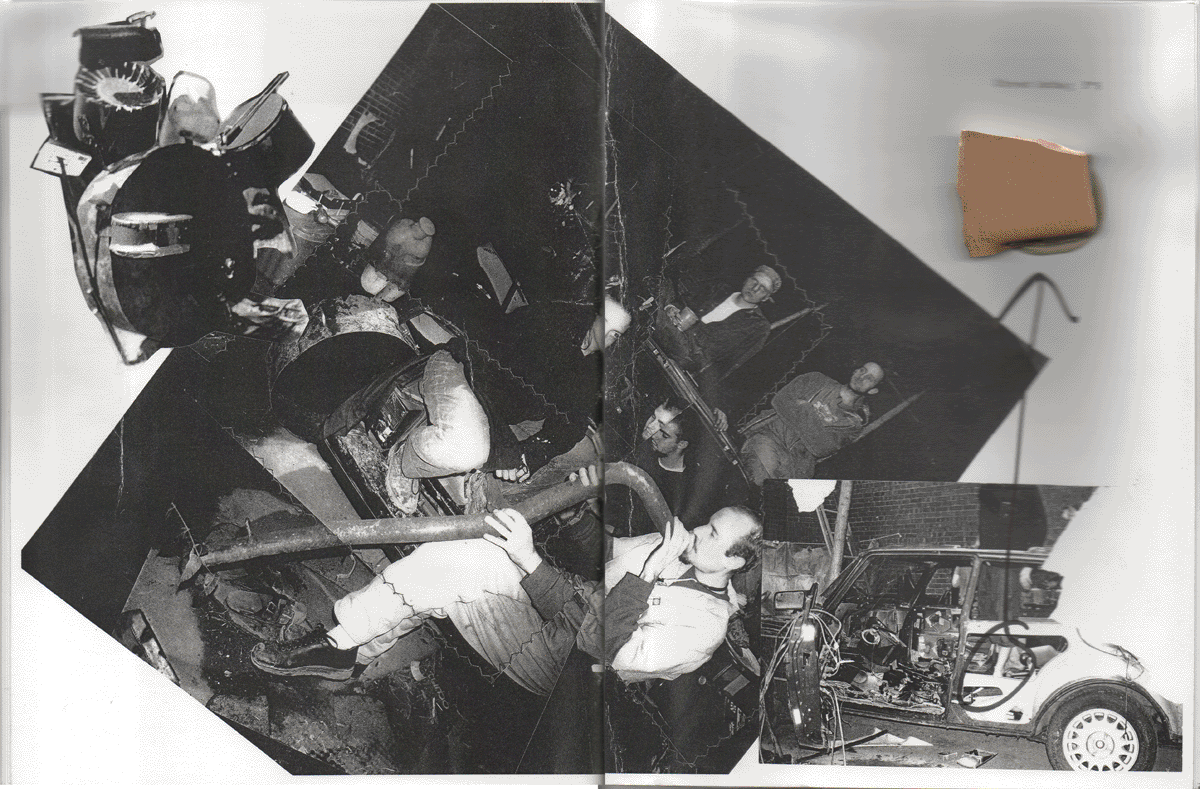
Andrew Smith Interview
- Pittsburgh, Pennsylvania, us@
- July 10, 2001
[So far in my posting of interviews I've been favoring the previously unpublished ones (or the otherwise most obscure ones) to bring them into availability. This interview was previously published in my magazine "Street Rat-Bag #5" (November, 2001) but since it's the companion piece to my being interviewed by Andrew Smith it seems appropriate to make them both available at the same time. The scans show the cover of the magazine that the interview appeared in & the way the pages we- August 22, 2014 note from tENTATIVELY, a cONVENIENCE]

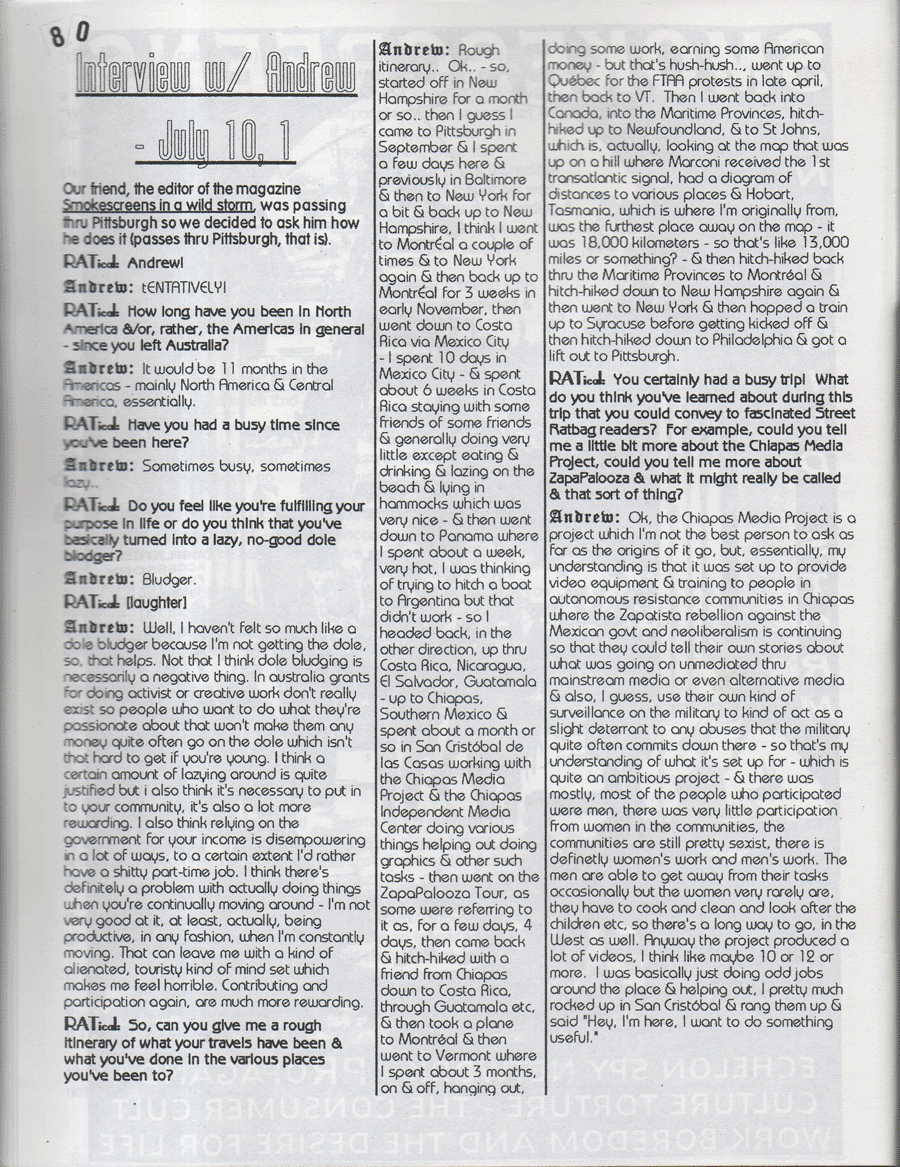
Interview w/ Andrew
- July 10, 1
Our friend, the editor of the magazine Smokescreens in a wild storm, was passing thru Pittsburgh so we decided to ask him how he does it (passes thru Pittsburgh, that is).
RATical: Andrew!
Andrew: tENTATIVELY!
RATical: How long have you been in North America &/or, rather, the Americas in general - since you left Australia?
Andrew: It would be 11 months in the Americas - mainly North America & Central America, essentially.
RATical: Have you had a busy time since you've been here?
Andrew: Sometimes busy, sometimes lazy..
RATical: Do you feel like you're fulfilling your purpose in life or do you think that you've basically turned into a lazy, no-good dole blodger?
Andrew: Bludger.
RATical: [laughter]
Andrew: Well, I haven't felt so much like a dole bludger because I'm not getting the dole, so, that helps. Not that I think dole bludging is necessarily a negative thing. In australia grants for doing activist or creative work don't really exist so people who want to do what they're passionate about that won't make them any money quite often go on the dole which isn't that hard to get if you're young. I think a certain amount of lazying around is quite justified but i also think it's necessary to put in to your community, it's also a lot more rewarding. I also think relying on the government for your income is disempowering in a lot of ways, to a certain extent I'd rather have a shitty part-time job. I think there's definitely a problem with actually doing things when you're continually moving around - I'm not very good at it, at least, actually, being productive, in any fashion, when I'm constantly moving. That can leave me with a kind of alienated, touristy kind of mind set which makes me feel horrible. Contributing and participation again, are much more rewarding.
RATical: So, can you give me a rough itinerary of what your travels have been & what you've done in the various places you've been to?
Andrew: Rough itinerary.. Ok.. - so, started off in New Hampshire for a month or so.. then I guess I came to Pittsburgh in September & I spent a few days here & previously in Baltimore & then to New York for a bit & back up to New Hampshire, I think I went to MontrÉal a couple of times & to New York again & then back up to MontrÉal for 3 weeks in early November, then went down to Costa Rica via Mexico City - I spent 10 days in Mexico City - & spent about 6 weeks in Costa Rica staying with some friends of some friends & generally doing very little except eating & drinking & lazing on the beach & lying in hammocks which was very nice - & then went down to Panama where I spent about a week, very hot, I was thinking of trying to hitch a boat to Argentina but that didn't work - so I headed back, in the other direction, up thru Costa Rica, Nicaragua, El Salvador, Guatamala - up to Chiapas, Southern Mexico & spent about a month or so in San Cristóbal de las Casas working with the Chiapas Media Project & the Chiapas Independent Media Center doing various things helping out doing graphics & other such tasks - then went on the ZapaPalooza Tour, as some were referring to it as, for a few days, 4 days, then came back & hitch-hiked with a friend from Chiapas down to Costa Rica, through Guatamala etc, & then took a plane to Montréal & then went to Vermont where I spent about 3 months, on & off, hanging out, doing some work, earning some American money - but that's hush-hush.., went up to Québec for the FTAA protests in late april, then back to VT. Then I went back into Canada, into the Maritime Provinces, hitch-hiked up to Newfoundland, & to St Johns, which is, actually, looking at the map that was up on a hill where Marconi received the 1st transatlantic signal, had a diagram of distances to various places & Hobart, Tasmania, which is where I'm originally from, was the furthest place away on the map - it was 18,000 kilometers - so that's like 13,000 miles or something? - & then hitch-hiked back thru the Maritime Provinces to Montréal & hitch-hiked down to New Hampshire again & then went to New York & then hopped a train up to Syracuse before getting kicked off & then hitch-hiked down to Philadelphia & got a lift out to Pittsburgh.
RATical: You certainly had a busy trip! What do you think you've learned about during this trip that you could convey to fascinated Street Ratbag readers? For example, could you tell me a little bit more about the Chiapas Media Project, could you tell me more about ZapaPalooza & what it might really be called & that sort of thing?
Andrew: Ok, the Chiapas Media Project is a project which I'm not the best person to ask as far as the origins of it go, but, essentially, my understanding is that it was set up to provide video equipment & training to people in autonomous resistance communities in Chiapas where the Zapatista rebellion against the Mexican govt and neoliberalism is continuing so that they could tell their own stories about what was going on unmediated thru mainstream media or even alternative media & also, I guess, use their own kind of surveillance on the military to kind of act as a slight deterrant to any abuses that the military quite often commits down there - so that's my understanding of what it's set up for - which is quite an ambitious project - & there was mostly, most of the people who participated were men, there was very little participation from women in the communities, the communities are still pretty sexist, there is definitely women's work and men's work. The men are able to get away from their tasks occasionally but the women very rarely are, they have to cook and clean and look after the children etc, so there's a long way to go, in the West as well. Anyway the project produced a lot of videos, I think like maybe 10 or 12 or more. I was basically just doing odd jobs around the place & helping out, I pretty much rocked up in San Cristóbal & rang them up & said "Hey, I'm here, I want to do something useful."
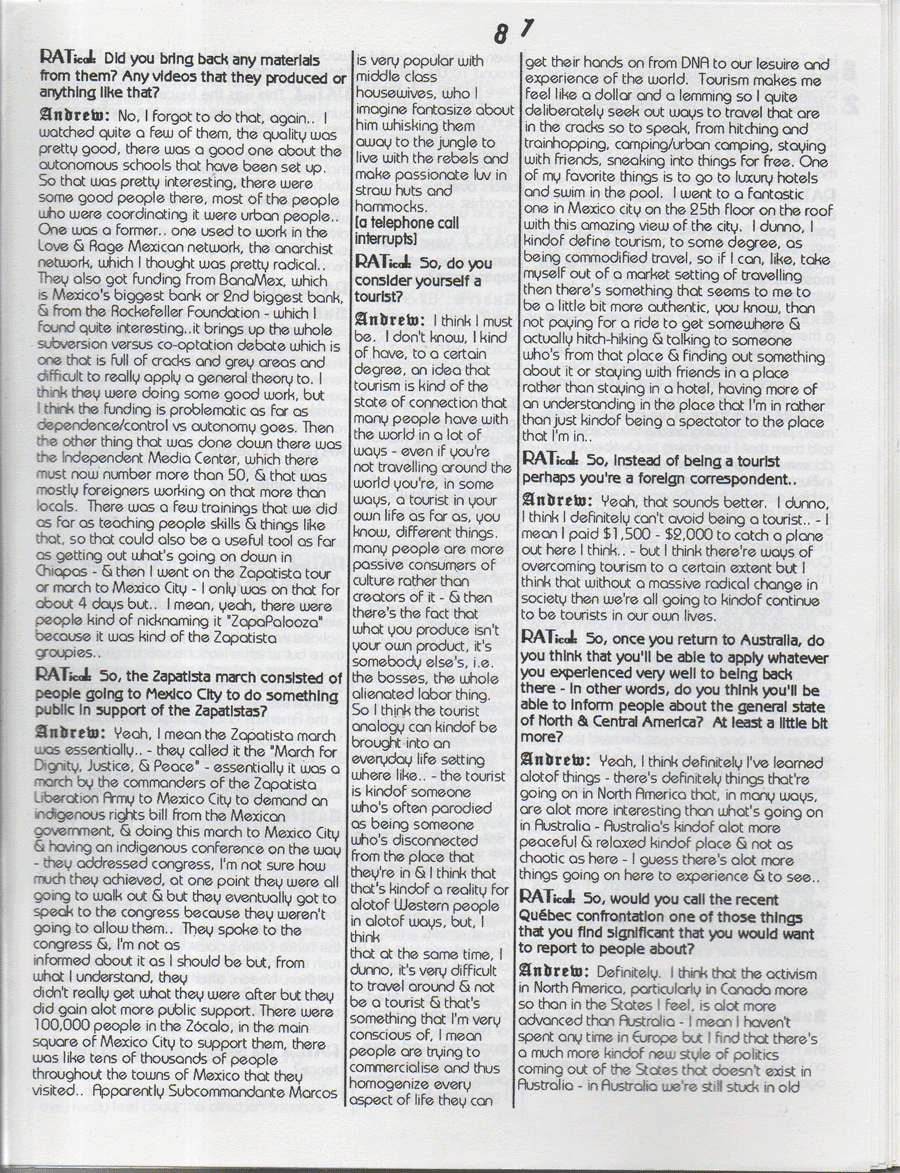
RATical: Did you bring back any materials from them? Any videos that they produced or anything like that?
Andrew: No, I forgot to do that, again.. I watched quite a few of them, the quality was pretty good, there was a good one about the autonomous schools that have been set up. So that was pretty interesting, there were some good people there, most of the people who were coordinating it were urban people.. One was a former.. one used to work in the Love & Rage Mexican network, the anarchist network, which I thought was pretty radical.. They also got funding from BanaMex, which is Mexico's biggest bank or 2nd biggest bank, & from the Rockefeller Foundation - which I found quite interesting..it brings up the whole subversion versus co-optation debate which is one that is full of cracks and grey areas and difficult to really apply a general theory to. I think they were doing some good work, but I think the funding is problematic as far as dependence/control vs autonomy goes. Then the other thing that was done down there was the Independent Media Center, which there must now number more than 50, & that was mostly foreigners working on that more than locals. There was a few trainings that we did as far as teaching people skills & things like that, so that could also be a useful tool as far as getting out what's going on down in Chiapas - & then I went on the Zapatista tour or march to Mexico City - I only was on that for about 4 days but.. I mean, yeah, there were people kind of nicknaming it "ZapaPalooza" because it was kind of the Zapatista groupies..
RATical: So, the Zapatista march consisted of people going to Mexico City to do something public in support of the Zapatistas?
Andrew: Yeah, I mean the Zapatista march was essentially.. - they called it the "March for Dignity, Justice, & Peace" - essentially it was a march by the commanders of the Zapatista Liberation Army to Mexico City to demand an indigenous rights bill from the Mexican government, & doing this march to Mexico City & having an indigenous conference on the way - they addressed congress, I'm not sure how much they achieved, at one point they were all going to walk out & but they eventually got to speak to the congress because they weren't going to allow them.. They spoke to the congress &, I'm not as informed about it as I should be but, from what I understand, they didn't really get what they were after but they did gain alot more public support. There were 100,000 people in the Zócalo, in the main square of Mexico City to support them, there was like tens of thousands of people throughout the towns of Mexico that they visited.. Apparently Subcommandante Marcos is very popular with middle class housewives, who I imagine fantasize about him whisking them away to the jungle to live with the rebels and make passionate luv in straw huts and hammocks. [a telephone call interrupts]
RATical: So, do you consider yourself a tourist?
Andrew: I think I must be. I don't know, I kind of have, to a certain degree, an idea that tourism is kind of the state of connection that many people have with the world in a lot of ways - even if you're not travelling around the world you're, in some ways, a tourist in your own life as far as, you know, different things. many people are more passive consumers of culture rather than creators of it - & then there's the fact that what you produce isn't your own product, it's somebody else's, i.e. the bosses, the whole alienated labor thing. So I think the tourist analogy can kindof be brought into an everyday life setting where like.. - the tourist is kindof someone who's often parodied as being someone who's disconnected from the place that they're in & I think that that's kindof a reality for alotof Western people in alotof ways, but, I think that at the same time, I dunno, it's very difficult to travel around & not be a tourist & that's something that I'm very conscious of, I mean people are trying to commercialise and thus homogenize every aspect of life they can get their hands on from DNA to our lesuire and experience of the world. Tourism makes me feel like a dollar and a lemming so I quite deliberately seek out ways to travel that are in the cracks so to speak, from hitching and trainhopping, camping/urban camping, staying with friends, sneaking into things for free. One of my favorite things is to go to luxury hotels and swim in the pool. I went to a fantastic one in Mexico city on the 25th floor on the roof with this amazing view of the city. I dunno, I kindof define tourism, to some degree, as being commodified travel, so if I can, like, take myself out of a market setting of travelling then there's something that seems to me to be a little bit more authentic, you know, than not paying for a ride to get somewhere & actually hitch-hiking & talking to someone who's from that place & finding out something about it or staying with friends in a place rather than staying in a hotel, having more of an understanding in the place that I'm in rather than just kindof being a spectator to the place that I'm in..
RATical: So, instead of being a tourist perhaps you're a foreign correspondent..
Andrew: Yeah, that sounds better. I dunno, I think I definitely can't avoid being a tourist.. - I mean I paid $1,500 - $2,000 to catch a plane out here I think.. - but I think there're ways of overcoming tourism to a certain extent but I think that without a massive radical change in society then we're all going to kindof continue to be tourists in our own lives.
RATical: So, once you return to Australia, do you think that you'll be able to apply whatever you experienced very well to being back there - in other words, do you think you'll be able to inform people about the general state of North & Central America? At least a little bit more?
Andrew: Yeah, I think definitely I've learned alotof things - there's definitely things that're going on in North America that, in many ways, are alot more interesting than what's going on in Australia - Australia's kindof alot more peaceful & relaxed kindof place & not as chaotic as here - I guess there's alot more things going on here to experience & to see..
RATical: So, would you call the recent Québec confrontation one of those things that you find significant that you would want to report to people about?
Andrew: Definitely. I think that the activism in North America, particularly in Canada more so than in the States I feel, is alot more advanced than Australia - I mean I haven't spent any time in Europe but I find that there's a much more kindof new style of politics coming out of the States that doesn't exist in Australia - in Australia we're still stuck in old left, Trotskyist kindof paradigms and the kindof group of people who're trying to work against that & create something a little bit different - a bit more diverse & creative, are kindof still the fringe element whereas here in the States & in Canada I wouldn't say that they're.. - they're more the driving force rather than the fringe..
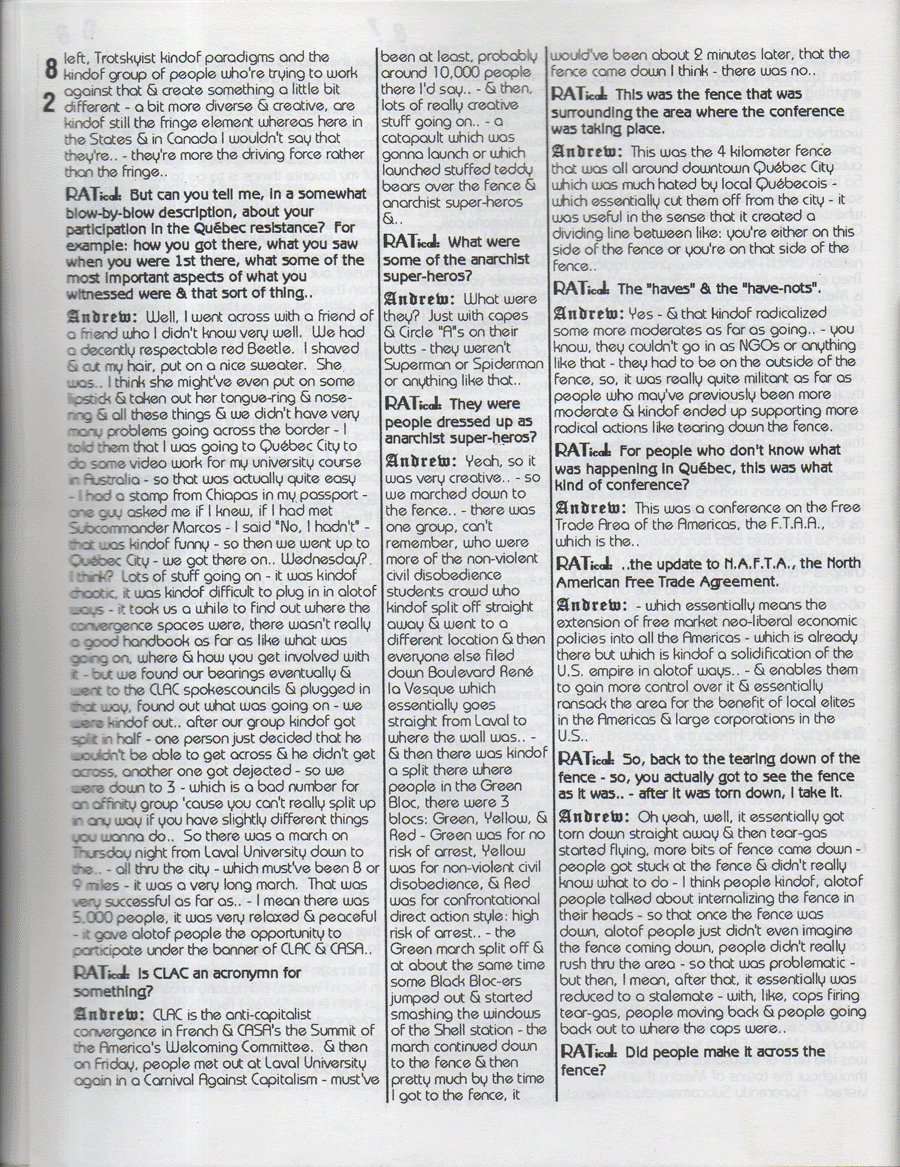
RATical: But can you tell me, in a somewhat blow-by-blow description, about your participation in the Québec resistance? For example: how you got there, what you saw when you were 1st there, what some of the most important aspects of what you witnessed were & that sort of thing..
Andrew: Well, I went across with a friend of a friend who I didn't know very well. We had a decently respectable red Beetle. I shaved & cut my hair, put on a nice sweater. She was.. I think she might've even put on some lipstick & taken out her tongue-ring & nose-ring & all these things & we didn't have very many problems going across the border - I told them that I was going to Québec City to do some video work for my university course in Australia - so that was actually quite easy - I had a stamp from Chiapas in my passport - one guy asked me if I knew, if I had met Subcommander Marcos - I said "No, I hadn't" - that was kindof funny - so then we went up to Québec City - we got there on.. Wednesday? I think? Lots of stuff going on - it was kindof chaotic, it was kindof difficult to plug in in alotof ways - it took us a while to find out where the convergence spaces were, there wasn't really a good handbook as far as like what was going on, where & how you get involved with it - but we found our bearings eventually & went to the CLAC spokescouncils & plugged in that way, found out what was going on - we were kindof out.. after our group kindof got split in half - one person just decided that he wouldn't be able to get across & he didn't get across, another one got dejected - so we were down to 3 - which is a bad number for an affinity group 'cause you can't really split up in any way if you have slightly different things you wanna do.. So there was a march on Thursday night from Laval University down to the.. - all thru the city - which must've been 8 or 9 miles - it was a very long march. That was very successful as far as.. - I mean there was 5,000 people, it was very relaxed & peaceful - it gave alotof people the opportunity to participate under the banner of CLAC & CASA..
RATical: Is CLAC an acronymn for something?
Andrew: CLAC is the anti-capitalist convergence in French & CASA's the Summit of the America's Welcoming Committee. & then on Friday, people met out at Laval University again in a Carnival Against Capitalism - must've been at least, probably around 10,000 people there I'd say.. - & then, lots of really creative stuff going on.. - a catapault which was gonna launch or which launched stuffed teddy bears over the fence & anarchist super-heros &..
RATical: What were some of the anarchist super-heros?
Andrew: What were they? Just with capes & Circle "A"s on their butts - they weren't Superman or Spiderman or anything like that..
RATical: They were people dressed up as anarchist super-heros?
Andrew: Yeah, so it was very creative.. - so we marched down to the fence.. - there was one group, can't remember, who were more of the non-violent civil disobedience students crowd who kindof split off straight away & went to a different location & then everyone else filed down Boulevard René la Vesque which essentially goes straight from Laval to where the wall was.. - & then there was kindof a split there where people in the Green Bloc, there were 3 blocs: Green, Yellow, & Red - Green was for no risk of arrest, Yellow was for non-violent civil disobedience, & Red was for confrontational direct action style: high risk of arrest.. - the Green march split off & at about the same time some Black Bloc-ers jumped out & started smashing the windows of the Shell station - the march continued down to the fence & then pretty much by the time I got to the fence, it would've been about 2 minutes later, that the fence came down I think - there was no..
RATical: This was the fence that was surrounding the area where the conference was taking place.
Andrew: This was the 4 kilometer fence that was all around downtown Québec City which was much hated by local Québecois - which essentially cut them off from the city - it was useful in the sense that it created a dividing line between like: you're either on this side of the fence or you're on that side of the fence..
RATical: The "haves" & the "have-nots".
Andrew: Yes - & that kindof radicalized some more moderates as far as going.. - you know, they couldn't go in as NGOs or anything like that - they had to be on the outside of the fence, so, it was really quite militant as far as people who may've previously been more moderate & kindof ended up supporting more radical actions like tearing down the fence.
RATical: For people who don't know what was happening in Québec, this was what kind of conference?
Andrew: This was a conference on the Free Trade Area of the Americas, the F.T.A.A., which is the..
RATical: ..the update to N.A.F.T.A., the North American Free Trade Agreement.
Andrew: - which essentially means the extension of free market neo-liberal economic policies into all the Americas - which is already there but which is kindof a solidification of the U.S. empire in alotof ways.. - & enables them to gain more control over it & essentially ransack the area for the benefit of local elites in the Americas & large corporations in the U.S..
RATical: So, back to the tearing down of the fence - so, you actually got to see the fence as it was.. - after it was torn down, I take it.
Andrew: Oh yeah, well, it essentially got torn down straight away & then tear-gas started flying, more bits of fence came down - people got stuck at the fence & didn't really know what to do - I think people kindof, alotof people talked about internalizing the fence in their heads - so that once the fence was down, alotof people just didn't even imagine the fence coming down, people didn't really rush thru the area - so that was problematic - but then, I mean, after that, it essentially was reduced to a stalemate - with, like, cops firing tear-gas, people moving back & people going back out to where the cops were..
RATical: Did people make it across the fence?
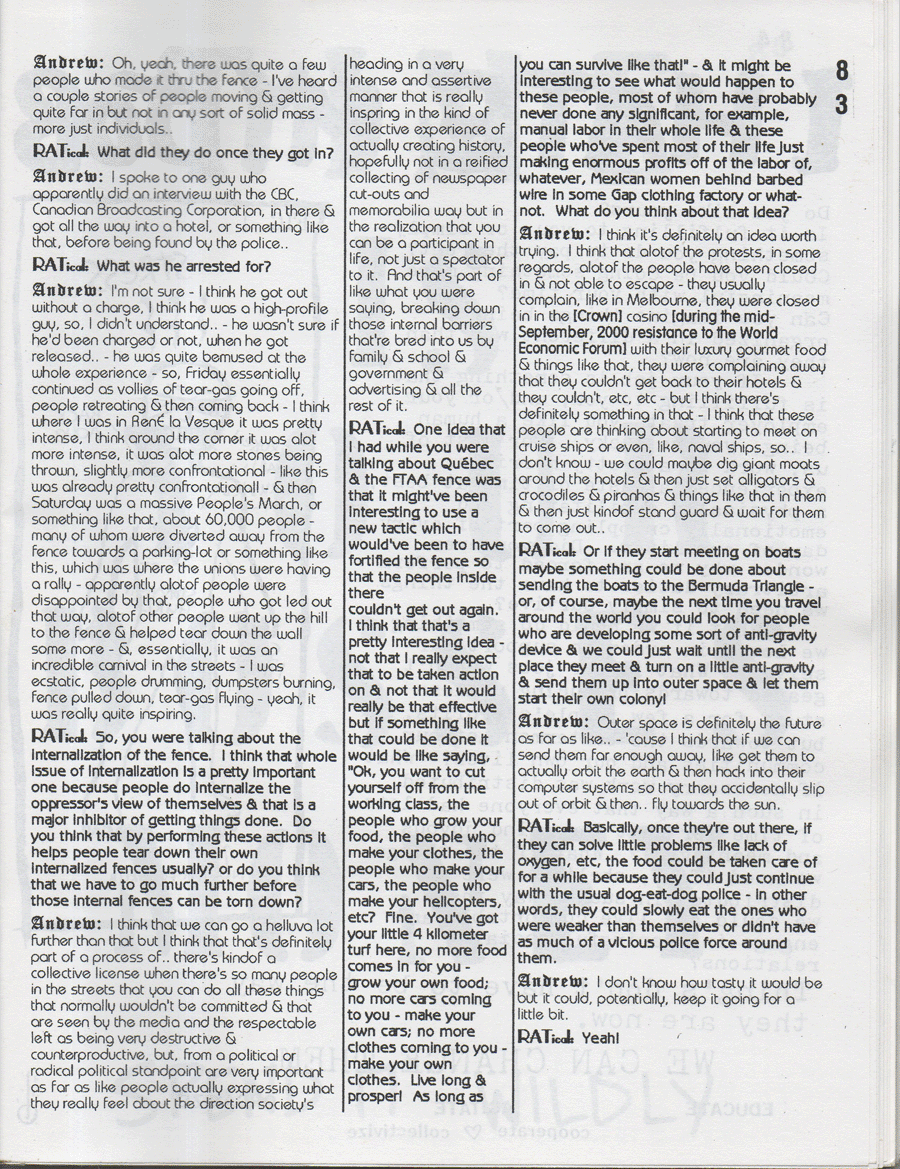
Andrew: Oh, yeah, there was quite a few people who made it thru the fence - I've heard a couple stories of people moving & getting quite far in but not in any sort of solid mass - more just individuals..
RATical: What did they do once they got in?
Andrew: I spoke to one guy who apparently did an interview with the CBC, Canadian Broadcasting Corporation, in there & got all the way into a hotel, or something like that, before being found by the police..
RATical: What was he arrested for?
Andrew: I'm not sure - I think he got out without a charge, I think he was a high-profile guy, so, I didn't understand.. - he wasn't sure if he'd been charged or not, when he got released.. - he was quite bemused at the whole experience - so, Friday essentially continued as vollies of tear-gas going off, people retreating & then coming back - I think where I was in RenÉ la Vesque it was pretty intense, I think around the corner it was alot more intense, it was alot more stones being thrown, slightly more confrontational - like this was already pretty confrontational! - & then Saturday was a massive People's March, or something like that, about 60,000 people - many of whom were diverted away from the fence towards a parking-lot or something like this, which was where the unions were having a rally - apparently alotof people were disappointed by that, people who got led out that way, alotof other people went up the hill to the fence & helped tear down the wall some more - &, essentially, it was an incredible carnival in the streets - I was ecstatic, people drumming, dumpsters burning, fence pulled down, tear-gas flying - yeah, it was really quite inspiring.
RATical: So, you were talking about the internalization of the fence. I think that whole issue of internalization is a pretty important one because people do internalize the oppressor's view of themselves & that is a major inhibitor of getting things done. Do you think that by performing these actions it helps people tear down their own internalized fences usually? or do you think that we have to go much further before those internal fences can be torn down?
Andrew: I think that we can go a helluva lot further than that but I think that that's definitely part of a process of.. there's kindof a collective license when there's so many people in the streets that you can do all these things that normally wouldn't be committed & that are seen by the media and the respectable left as being very destructive & counterproductive, but, from a political or radical political standpoint are very important as far as like people actually expressing what they really feel about the direction society's heading in a very intense and assertive manner that is really inspring in the kind of collective experience of actually creating history, hopefully not in a reified collecting of newspaper cut-outs and memorabilia way but in the realization that you can be a participant in life, not just a spectator to it. And that's part of like what you were saying, breaking down those internal barriers that're bred into us by family & school & government & advertising & all the rest of it.
RATical: One idea that I had while you were talking about Québec & the FTAA fence was that it might've been interesting to use a new tactic which would've been to have fortified the fence so that the people inside there couldn't get out again. I think that that's a pretty interesting idea - not that I really expect that to be taken action on & not that it would really be that effective but if something like that could be done it would be like saying, "Ok, you want to cut yourself off from the working class, the people who grow your food, the people who make your clothes, the people who make your cars, the people who make your helicopters, etc? Fine. You've got your little 4 kilometer turf here, no more food comes in for you - grow your own food; no more cars coming to you - make your own cars; no more clothes coming to you - make your own clothes. Live long & prosper! As long as you can survive like that!" - & it might be interesting to see what would happen to these people, most of whom have probably never done any significant, for example, manual labor in their whole life & these people who've spent most of their life just making enormous profits off of the labor of, whatever, Mexican women behind barbed wire in some Gap clothing factory or what-not. What do you think about that idea?
Andrew: I think it's definitely an idea worth trying. I think that alotof the protests, in some regards, alotof the people have been closed in & not able to escape - they usually complain, like in Melbourne, they were closed in in the [Crown] casino [during the mid-September, 2000 resistance to the World Economic Forum] with their luxury gourmet food & things like that, they were complaining away that they couldn't get back to their hotels & they couldn't, etc, etc - but I think there's definitely something in that - I think that these people are thinking about starting to meet on cruise ships or even, like, naval ships, so.. I don't know - we could maybe dig giant moats around the hotels & then just set alligators & crocodiles & piranhas & things like that in them & then just kindof stand guard & wait for them to come out..
RATical: Or if they start meeting on boats maybe something could be done about sending the boats to the Bermuda Triangle - or, of course, maybe the next time you travel around the world you could look for people who are developing some sort of anti-gravity device & we could just wait until the next place they meet & turn on a little anti-gravity & send them up into outer space & let them start their own colony!
Andrew: Outer space is definitely the future as far as like.. - 'cause I think that if we can send them far enough away, like get them to actually orbit the earth & then hack into their computer systems so that they accidentally slip out of orbit & then.. fly towards the sun.
RATical: Basically, once they're out there, if they can solve little problems like lack of oxygen, etc, the food could be taken care of for a while because they could just continue with the usual dog-eat-dog police - in other words, they could slowly eat the ones who were weaker than themselves or didn't have as much of a vicious police force around them.
Andrew: I don't know how tasty it would be but it could, potentially, keep it going for a little bit.
RATical: Yeah!
idioideo at verizon dot net
to the tENTATIVELY, a cONVENIENCE as Interviewer page
to the tENTATIVELY, a cONVENIENCE as Interviewee page
to the tENTATIVELY, a cONVENIENCE movie-making "Press: Criticism, Interviews, Reviews" home-page
to the "tENTATIVELY, a cONVENIENCE - Sprocket Scientist" home-page
to the "FLICKER" home-page for the alternative cinematic experience
to find out more about why the S.P.C.S.M.E.F. (Society for the Prevention of Cruelty to Sea Monkeys by Experimental Filmmakers) is so important
for info on tENTATIVELY, a cONVENIENCE's tape/CD publishing label: WIdémoUTH
to see an underdeveloped site re the N.A.A.M.C.P. (National Association for the Advancement of Multi-Colored Peoples)